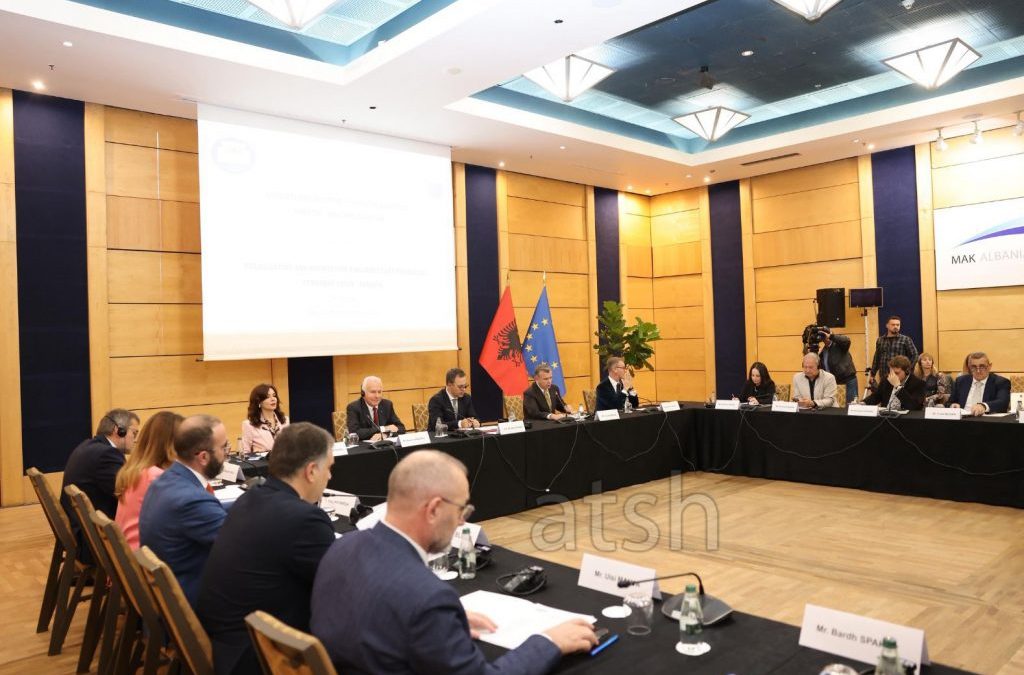In Tirana, the 20th meeting of the Parliamentary Committee on Stabilization-Association is being held over two days. The meeting was co-chaired by the head of the parliamentary group of the Socialist Party, Taulant Balla, and Marco Tarquinio, head of the European Parliament delegation.
Nine Members of the European Parliament, part of the Parliamentary Committee on Stabilization-Association, are in Albania to assess the country’s progress towards EU membership.
Tarquinio stated in his opening remarks that the European Parliament will continue to assist the Assembly of Albania, as Albania is in the final part of the path leading to EU membership.
“We will continue to work together for people to live a better life,” he said, emphasizing the importance of continuing cooperation. “The European Parliament has decided to establish the Western Balkans antenna in Tirana, in this excellent capital of this part of Europe,” said Tarquinio, adding that membership will be the fruit of joint efforts.
The co-chair of the committee, the head of the parliamentary group of the majority, Taulant Balla, declared that Albania is at the most important moment on its path to EU membership.
“Three years after the official opening of negotiations, Albania is at the most advanced stage of its integration process. In less than a year, our country has opened five out of six negotiation chapters, including the rule of law, the internal market, competitiveness, the green agenda, and foreign policies. This is a pace rarely recorded in the history of EU enlargement and is clear evidence of Albania’s readiness to move forward quickly, responsibly, and reliably,” Balla stated.
The Ambassador of the European Union, Silvio Gonzato, from the 20th meeting of the Parliamentary Committee on Stabilization-Association Albania–EU emphasized that the Albanian government has a very ambitious agenda for integration into the European Union.
“This is an ambition of both parties, thus EU membership remains a common national objective and enjoys broad support across the political spectrum. This is a very important issue because, in fact, membership is a transformative process that requires commitment and dedication from all sectors of society and their elected representatives,” Gonzato emphasized.
The deputy of the opposition Democratic Party, deputy chair of the Albanian delegation to the committee, Jorida Tabaku, highlighted the importance of Albania’s integration process into the European Union, emphasizing that the country’s future is in the EU, but the way the process should develop needs improvement.
She expressed concern about the lack of transparency and the inclusion of the opposition, stressing that while on paper Albania has opened chapters, in reality, the process lacks broad discussion and inclusiveness, leaving out parliament, civil society, business, and interest groups.
According to her, integration is not statistics and cannot be reduced to the opening of chapters, but must reflect tangible changes and real reforms that impact the lives of citizens.
The Parliamentary Committee on Stabilization Association EU-Albania (KPSA) was established based on the decision of the Conference of Presidents of the European Parliament dated January 21, 2010, and the decision of the Assembly of Albania dated March 26, 2010.
The tasks of the Parliamentary Committee on Stabilization-Association EU-Albania include reviewing all aspects of the relations between the EU and Albania and, in particular, the implementation of the Stabilization Association Agreement.
The committee meets twice a year: once in Tirana and once in Brussels or Strasbourg.
The members of the Committee (the Albanian side and the EU side) discuss topics related to the rule of law, corruption, aligning foreign policy with that of the EU, and adopt recommendations. Recommendations will be considered approved if they receive the support of the majority of the members of the European Parliament delegation and the Albanian Parliament delegation present at the meeting. (October 28)
 go to the original language article
go to the original language article
